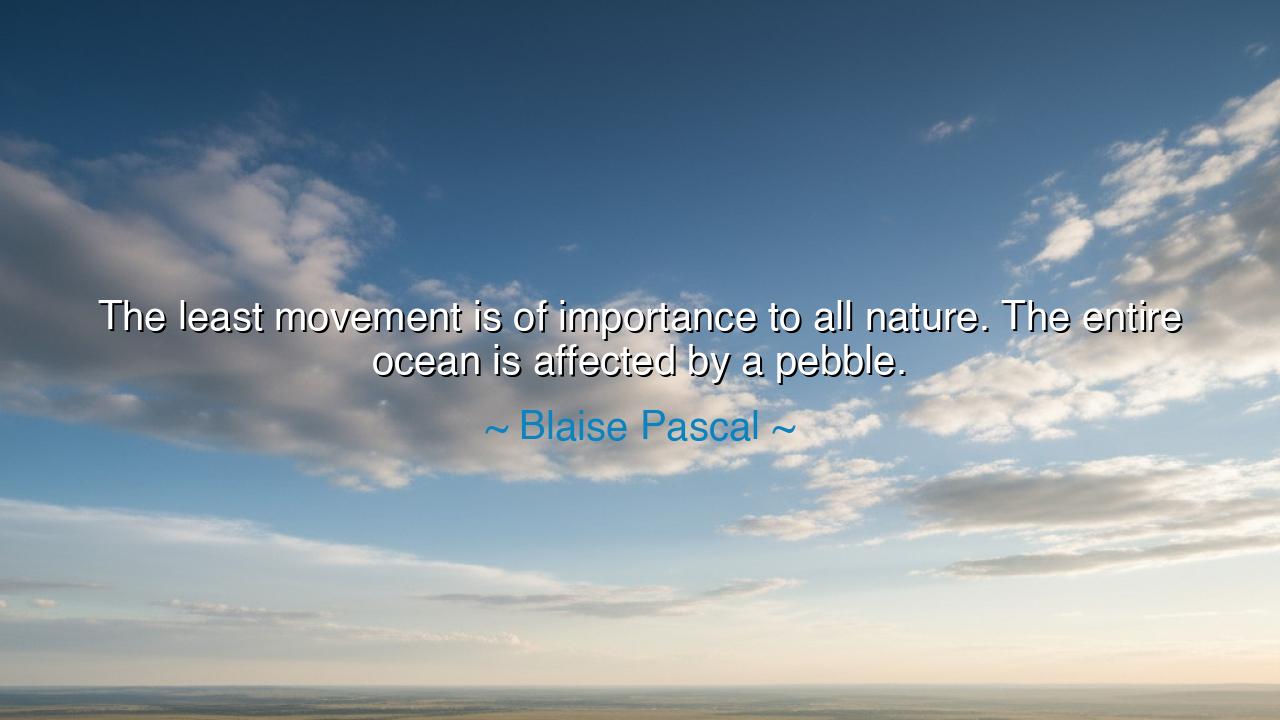
The least movement is of importance to all nature. The entire
The least movement is of importance to all nature. The entire ocean is affected by a pebble.






Hear, O child of eternity, the words of Blaise Pascal, who declared: “The least movement is of importance to all nature. The entire ocean is affected by a pebble.” This saying is not the idle musing of a mathematician, but the thunder of truth whispered in gentle syllables. It is a vision of interconnection, a reminder that no act, no thought, no gesture is without consequence. The pebble, though small, does not sink in silence—it stirs the waters, and the ripples travel farther than the eye can follow.
Pascal, a thinker of both reason and faith, lived in a time when the sciences were awakening, when men began to measure stars and chart seas. Yet he knew that beyond numbers and instruments lay a deeper law: that all things are bound together in a vast web. The flutter of a wing, the lifting of a hand, the turning of a heart—all are movements that echo in the halls of eternity. Thus, he saw the ocean not merely as water, but as a symbol of the whole cosmos, vast yet tender to the slightest touch.
Consider the story of the young monk Martin Luther, who one night nailed his ninety-five theses to a church door in Wittenberg. To his neighbors, it was but a pebble, a single man’s protest against indulgences. Yet that act sent ripples across the ocean of Europe. Kingdoms shook, empires divided, and the course of civilization was altered. One man, with one small movement, changed the fate of nations. Thus, history testifies: no act is too small to matter.
And think also of the natural world. The honeybee, often overlooked, performs its humble work of pollination. Yet remove the bee, and the ocean of life begins to falter: flowers wither, fruits vanish, and countless creatures starve. The least movement of that tiny insect sustains the order of the earth. What appears insignificant is, in truth, essential. As Pascal teaches, every pebble has its place in the symphony of nature.
The meaning is both humbling and empowering. It humbles, because we are reminded that our deeds, whether hidden or small, ripple outward in ways we cannot predict. It empowers, because it assures us that our choices matter, that even the smallest act of kindness or cruelty does not vanish into nothingness. To live, then, is to cast pebbles into the ocean of existence, shaping the waves of tomorrow.
The lesson for you, listener, is clear: do not despise small beginnings. Do not say, “This deed is too little, this word too weak, this effort too small.” For the universe is a living fabric, and your thread is woven into its design. The smallest gesture—a smile to a stranger, a word of encouragement, a prayer in the night—may stir ripples that reach far beyond your sight. Likewise, be watchful, for careless words and selfish deeds spread their own currents.
Practical actions lie before you: seek to plant seeds of kindness, even in secret; perform your duties with diligence, even when unnoticed; refrain from actions that poison, for even the smallest drop of bitterness spreads into the tide. Live as one who knows that the ocean listens, that nature remembers, that eternity itself is stirred by your choices.
And so, beloved, take Pascal’s wisdom to heart: the least movement is of importance. Your life is no pebble cast in vain. The ocean receives it, the ripples flow outward, and all of creation is moved. Walk, then, with reverence, for the universe responds to every step you take.






AAdministratorAdministrator
Welcome, honored guests. Please leave a comment, we will respond soon